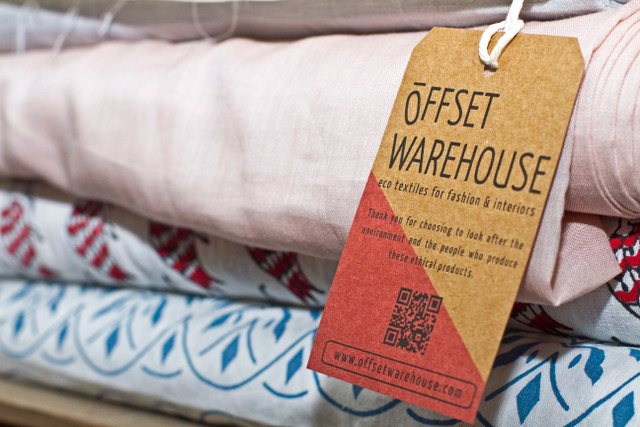Charlie Ross, Offset Warehouse
While Charlie Ross was studying her Masters at the Royal College of Art and trying to make her collections as ethically as possible, she realised something vital was missing.
“Trying to get hold of organic or fair trade fabrics or anything handwoven in the quantities and colours I needed - and in fashion-forward textures - was really difficult,’ she says. “I had to do tons of research.” That research led, when she graduated, to the launch of Offset Warehouse, an online resource stocking hundreds of ethical fabrics from around the world.
From cottons, handwoven in a fairtrade certified community in India, to sea green jersey made from bamboo in China, each fabric is intricately described and ethically checklisted; designers choose the fabric that’s right for their work and their values.
Looking for Azo-Free and Fair Trade Certified? Find it here. Low Energy, Low Impact Dyes, Low Water, No Genetically Modified Crops, VOC-Free? Want all of the above? Check this blush pink Fairtrade Certified Cotton Chambray from India. It’s a winner.
Discovering the right fabrics has been a labour of love, taking Charlie around the world. “The last sourcing job I did was in Thailand, which was unbelievable,” she recalls. “We found this hill tribe in the middle of nowhere ….”
There’s an obvious pride in working with small, local co-operatives. Apart from finding a unique fabric, trade also creates value for crafts that are going unrecognised or, in some cases, disappearing altogether. At the same time, selling their work gives craftspeople, mainly women, ways of providing for their families.
But when you work with the small and the individual, there’s often a price. “Sometimes, fabrics will come and colours aren't quite the same or there's a banding because they've been dyeing the fabrics literally in buckets,” says Charlie.
Some clients embrace discrepancies, others don’t. But the mood is shifting. “Yes, we still come up against designers who are like 'no, we need it to be completely consistent’”, admits Charlie. “But I've seen huge changes. Now, it's so much more about 'wow, isn't that a beautiful fabric’?”
A turning point happened earlier this year. “I was in this meeting with a top British high street brand and somebody said to me 'Oh, I love this fabric. What’s the lead-time on it?' And I said, 'Well, it's handwoven so it will be about two to three months.’ And she was, like, ’Wow, that's a lot longer than what we'd usually work to.'
“Normally, in fashion, it’s an incredibly quick turn-around. But then she said to me, ‘I think maybe we should start making some changes.’ That was such a moment for me. It was really indicative of a change in mind-set and a willingness to work around things and compromise. I'd never heard that before …”
Innovation is another area of focus. “There are so many exciting ones,” says Charlie. “One I really like is reconstituting microfibre plastics into a yarn because microfibre pollution is bad and it's something that's only just come into our understanding.”
“I love things that solve problems. [Japanese Royal College of Art graduate Yurii Kasao] was inspired by a jellyfish overpopulation intoo looking at ways to turn jellyfish fibres into a leather-like fabric. And that’s really exciting and innovative.”
The Offset Warehouse plugs into so many concerns driving ethical fashion forward: trading fairly with peoples from other nations; environmental standards; looking to innovation to provide answers to entrenched problems - and in a surge of interest in making one’s own clothes, something Charlie focuses on in her own blog posts.
“There's a huge leap in sales of sewing machines,” she says, joyfully. “It's tied in with people wanting to understand how things are made and wanting something that fits properly and realising that the only way that is going to happen is by doing it themselves. There's a real growth in treasuring things that you've made yourself …”
Ross runs monthly sewing workshops: “On a few occasions, we've had people who've said ‘I bought a sewing machine 25 years ago and never got it out and I’ve just decided I really want to get into it’.”
Meanwhile, Offset Warehouse is expanding out into the community, taking its learning and passion into talks and workshops. Ross has just launched the Members' Club, a monthly subscription service for creative entrepreneurs around the world who want to build sucessful businesses sustainably.
Each month, the Club will focus on a different topic to help brands grow, and also feature an interview with inspiring creative enterprises doing something different. It's another branch to a project fuelled by beliefs that the fashion industry - and industry in general - can and must respond to the issues affecting the world today. Azo-Free, Fair Trade Certified, Low Energy, VOC-Free, etc? It's all here for the making.



